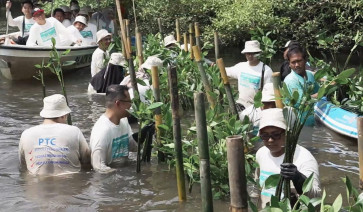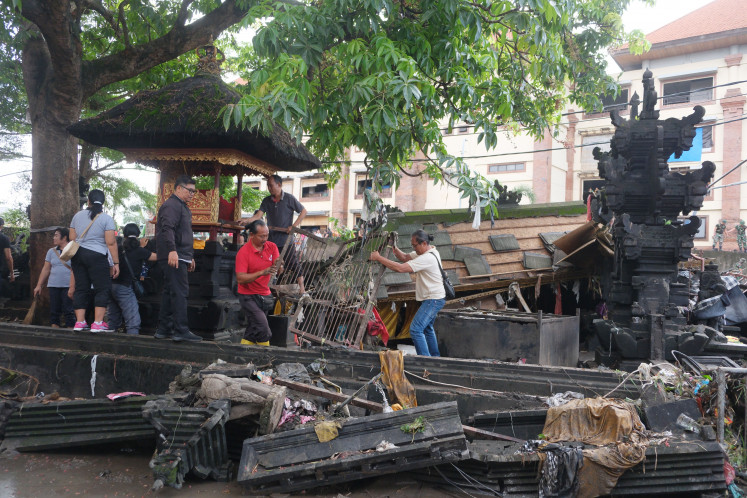Popular Reads
Top Results
Can't find what you're looking for?
View all search resultsPopular Reads
Top Results
Can't find what you're looking for?
View all search resultsIFC continues financing RI coal mining firms despite ban: Report
The World Bank’s private-sector arm, the International Finance Corporation (IFC), has been quietly funding some of Indonesia’s most destructive coal mining companies despite its 2013 virtual ban on coal financing, a report says
Change text size
Gift Premium Articles
to Anyone
T
he World Bank’s private-sector arm, the International Finance Corporation (IFC), has been quietly funding some of Indonesia’s most destructive coal mining companies despite its 2013 virtual ban on coal financing, a report says.
The collaborative report by Inclusive Development International, the Bank Information Center Europe and Jakarta-based coal watchdog Mining Advocacy Network (Jatam), was released at a policy forum in advance of the World Bank’s 2019 Spring Meetings in Washington, DC.
According to the report, the IFC had indirectly bankrolled six major coal mining companies in Indonesia, which it said had decimated rain forests and biodiversity, threatened the country’s food security and displaced thousands of indigenous people from their homes and land.
Two of the Indonesian coal companies mentioned in the report are Bumi Resources and Adaro Energy, although both have denied any involvement in the financing schemes.
“No IFC loan has been given to Bumi,” Bumi Resources corporate secretary Dileep Srivastava told The Jakarta Post. Adaro Energy also denied the content of the report.”We didn’t receive any loans from the IFC,” Adaro head of corporate communications Febriati Nadira said.
The Post has sought for comment from Shahreza Hoesin, IFC communication officer for Indonesia, Malaysia and Timor Leste, who said he needed time to consult with his colleagues in charge of the issue.
The report further argues that the “hidden financial flows” are in violation of the IFC’s social and environmental performance standards and are in conflict with the World Bank’s limitation on direct financing for coal — applied since 2013 as part of its efforts to reduce climate change impacts.
The report stated that the financing schemes had involved commercial banks and private equity funds as intermediaries, to which the IFC had disbursed more than half of its development budget, which amounts to US$6.4 billion in fiscal 2018 alone.
These financial intermediaries then invested the funds to more than 150 companies and projects around the world that had violated human rights and damaged the environment, the report suggested, adding that more than half of them involved coal.
Such investments were made with little oversight, including from the IFC, the report added.
“Money is fungible so if the IFC doesn’t put strict measures in place to ensure that its funds are actually being used to achieve a positive development impact, then banks will continue to go about their business as usual while reaping the benefits of the World Bank’s green stamp of approval,” Inclusive Development International executive director David Pred said in a statement.
The statement also revealed that in response to the findings, the IFC had recently unveiled a draft plan called the Green Equity Strategy, which is designed to move its client banks away from financing coal and toward renewable energy. It also introduced an approach known as “ring fencing”, which requires its clients to direct their money for specific development purposes such as small business loans.
Inclusive Development International and Bank Information Center Europe urged the IFC to speed up the Green Equity Strategy’s timeline of targets and extend restrictions to other fossil fuels, and also called on the IFC to be more transparent, rigorous and accountable in its ring fencing of financial-sector investments.
“The IFC influences over $4.5 trillion of investments in emerging markets, so these moves signal the beginning of the end for coal,” co-director of Bank Information Center Europe, Kate Geary, said.
Energy watchdog Institute for Essential Services Reform executive director, Fabby Tumiwa, said the IFC’s move to quit financing the coal sector would help push for the development of renewable energy sources, which was aligned with the commitments of the World Bank and the IFC.
This was because coal miners had been facing difficulties in securing financing lately as concerns over climate change had pushed financial institutions away from the sector, he added.
He called on the Indonesia government, as a shareholder that had previously agreed to the World Bank’s 2013 ban on coal financing, to urge the IFC to be more transparent in its financing, especially those done with intermediaries, and restrict itself from financing socially and environmentally harmful projects.
The IFC has reportedly refused to publicly disclose a vast majority of its end users, citing client confidentiality rules. (ars)










